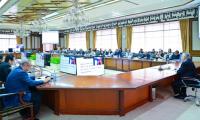KABUL: The Taliban government expanded its interim cabinet by naming deputy ministers on Tuesday. But it failed to appoint any women despite the international outcry that followed their initial presentation of an all-male cabinet line-up earlier this month.
The international community has warned that it will judge the Taliban by its actions, and that recognition of a Taliban-led government would be linked to the treatment of women and minorities, international media reported.
The newly-introduced cabinet members include commerce minister Haji Noor Uddin and his deputies Haji Muhammad Bashir and Haji Azim Sultan, all from the minority Tajik community. Similarly, Muhammad Hassan Ghyasi, a doctor from the Hazara minority, has been named the second deputy minister of public health.
Of the 21 existing portfolios in the Taliban government, the trade minister was appointed on Tuesday, while Qalandar Ebad took over the charge of the public health ministry from Wahid Majrood, the only minister of the ousted government who had remained on his post. Mullah Sadar Ibrahim was named the deputy interior minister, Abdul Qayoom Zakir as the deputy defence minister, and pro-Taliban academician Nazar Muhammad as the new interim president of the Afghan Olympic Committee.
Taliban government spokesman Zabihullah Mujahid defended the latest additions to the cabinet at a news conference on Tuesday, saying it included members of ethnic minorities, such as the Hazaras, and that women might be added later. Zabihullah Mujahid bristled at international conditions for recognition, saying there was no reason for withholding it.
“It is the responsibility of the United Nations to recognise our government [and] for other countries, including European, Asian and Islamic countries, to have diplomatic relations with us,” he said. He also took the time to announce several appointments, including ministers and deputy ministers, to the Taliban’s caretaker government.
The appointments included figures from Panjshir and Baghlan. Panjshir is home to the National Resistance Front, which is the sole large-scale effort to try and keep the Taliban from taking over the entire country. Baghlan has also seen pockets of resistance in some districts over the last month. By pointing out that three of the new posts would be given to residents of Panjshir, Baghlan and Sar-e-Pul, provinces with considerable Tajik and Uzbek populations, the Taliban seem to be sending a message of inclusivity.
The Taliban have framed the cabinet as an interim government, suggesting that changes were still possible, but they have not said if there would ever be elections. Pakistan has also been among the countries calling on the Taliban to establish an inclusive government.
Earlier this week, Prime Minister Imran Khan said in a Twitter post he “initiated a dialogue with the Taliban for an inclusive Afghan govt to include Tajiks, Hazaras & Uzbeks”. The inclusive government will ensure “peace and a stable Afghanistan”, he added.
The spokesman said that Iran, Qatar, Pakistan and a few other countries were advising the Taliban over how to get “officially recognised.” On Tuesday, Zabihullah Mujahid was also asked about the recent restrictions imposed on girls and women, including a decision not to allow girls in grades six to 12 to return to classrooms for the time being. He suggested this was a temporary decision, and that “soon it will be announced when they can go to school”.
He said plans were being made to allow for their return, but did not elaborate. Boys in grades six to 12 resumed their studies over the weekend. Many government employees have not been paid for months, with food prices soaring. "We are working on a mechanism for the payment of salaries. Salaries will be paid to all the employees in coming days," Zabihullah Mujahid said.
The government has returned the services of BS-20 officer of Information Service Shafqat Abbas to the Ministry of...
Previously, the prime minister had given four days to the committee to fix responsibily for the import of wheat
The petitioner stated that the electoral body had no authority to interpret the constitution
CM was briefed that in first phase, 12 schools for special children would be completely revamped this year
Anti-Corruption Establishment filed appeals against 58 sentences handed down by the courts from January 1, 2018 to...







